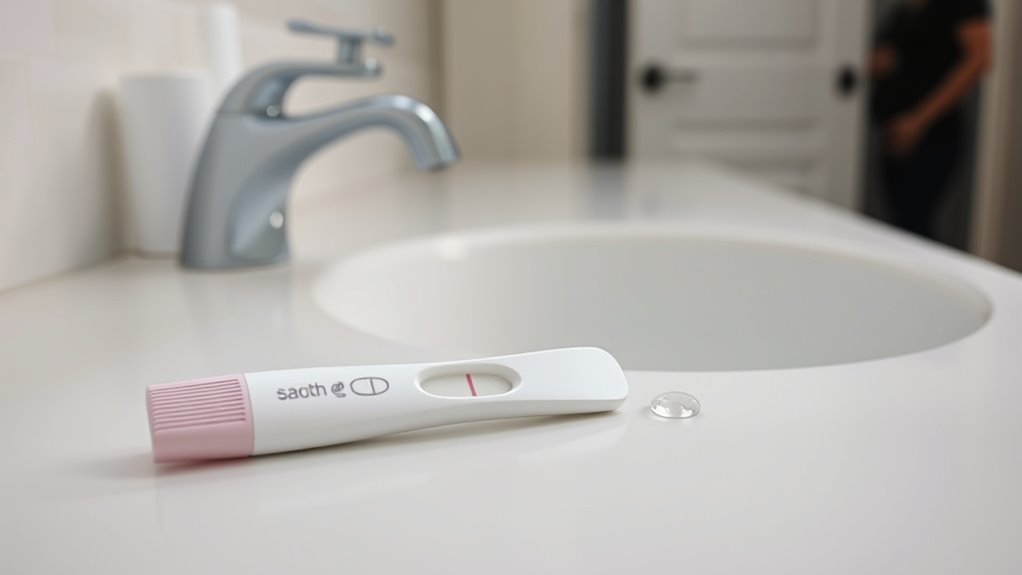If you notice any signs of miscarriage, it’s natural to feel concerned. Common symptoms include vaginal bleeding, which can vary from light spotting to heavy flow, along with cramping or pain in your lower abdomen. You might also experience a sudden loss of pregnancy symptoms, such as breast tenderness or nausea. Seeking medical advice is crucial if these signs arise, as they could indicate a serious issue. There’s more to understand about this topic, so keep exploring.
Key Takeaways
- Vaginal bleeding, whether light or heavy, is the most common sign of a potential miscarriage.
- Accompanying symptoms like lower abdominal cramping or pain may indicate a miscarriage is occurring.
- The discharge of fluid or tissue from the vagina can signify a miscarriage has taken place.
- A sudden loss of pregnancy symptoms, such as nausea or breast tenderness, can be concerning.
- Immediate medical evaluation is essential if experiencing heavy bleeding or severe pain.

When you’re pregnant, it’s natural to feel a mix of excitement and anxiety, especially as you become aware of the signs of a potential miscarriage. Miscarriage, defined as the loss of a pregnancy before 20 weeks of gestation, affects approximately 10-20% of known pregnancies. Most often, these heartbreaking events occur during the first trimester, before the 10-week mark. Understanding the common symptoms can help you navigate this uncertain time with more awareness.
Vaginal bleeding stands out as the most common symptom of miscarriage, varying from light spotting to heavier bleeding. If you notice this symptom, pay attention to any accompanying lower abdominal cramping or pain, which frequently occurs alongside it. Sometimes, you might even experience the discharge of fluid or tissue from the vagina. Additionally, a sudden loss of pregnancy symptoms—like nausea or breast tenderness—can signal a problem. If you find yourself facing heavy bleeding or severe pain, don’t hesitate to seek immediate medical attention.
There are different types of miscarriages to be aware of. A threatened miscarriage presents with bleeding and cramping, yet the cervix remains closed. An inevitable miscarriage, on the other hand, involves bleeding and cramping with an open cervix. In a complete miscarriage, all pregnancy tissue is expelled, whereas an incomplete miscarriage means some tissue remains, necessitating medical intervention. A missed miscarriage may occur without noticeable symptoms, making it essential to keep up with check-ups and ultrasounds.
While first-trimester miscarriages are more common, second-trimester losses occur in about 2-3% of pregnancies. Symptoms during this stage can mirror those of the first trimester, including bleeding and abdominal pain, along with a potential loss of fetal movement. If you experience any concerning symptoms, medical evaluation is crucial, as more than 80% of miscarriages occur in the first trimester.
Several factors can contribute to the risk of miscarriage. Genetic problems with the fetus, uterine or cervical abnormalities, and chronic diseases like polycystic ovary syndrome can all play a role. Your age and history of previous miscarriages also matter, along with lifestyle choices such as smoking.
If you face a miscarriage, medical evaluation is key. Ultrasound and hormone tests can help confirm the situation, and treatment may involve procedures to remove remaining tissue.
Frequently Asked Questions
Can Stress Cause a Miscarriage?
Can stress cause a miscarriage? While studies suggest that high stress levels may increase the risk, it’s crucial to remember that stress isn’t universally accepted as a proven cause.
Most miscarriages stem from chromosomal abnormalities or other factors. It’s essential to manage stress for your overall health during pregnancy.
Engaging in relaxation techniques, maintaining a balanced diet, and seeking support can help you navigate this challenging time more effectively.
How Common Are Miscarriages in Early Pregnancy?
Miscarriages are fairly common, occurring in about 10-20% of known pregnancies, especially in early stages.
You should know that around 80% happen during the first trimester.
Factors like advanced maternal age, lifestyle choices, and certain medical conditions can increase the risk.
If you’re pregnant, it’s important to stay informed and monitor your health, but remember that many women go on to have successful pregnancies after experiencing a miscarriage.
What Emotional Support Is Available After a Miscarriage?
After a miscarriage, you can find emotional support through various avenues.
Consider accessing mental health services like therapy or counseling to process your feelings. Self-care practices are essential for healing; don’t forget to prioritize them.
Joining support groups connects you with others who understand your experience. Limiting exposure to pregnancy-related content on social media can help reduce distress.
Creating a memorial can also aid in honoring your loss and coping with grief.
Are There Long-Term Effects on Future Pregnancies?
Yes, there are long-term effects on future pregnancies after a miscarriage.
You might face increased risks like gestational diabetes and preterm birth, especially if you’ve had multiple miscarriages.
Your mental health can also be impacted, with heightened anxiety and stress in subsequent pregnancies.
It’s essential to discuss these risks with your healthcare provider, who can offer tailored support and monitoring to help you navigate future pregnancies more safely and confidently.
When Should I Seek Medical Help After a Miscarriage?
Imagine walking through a dense fog, unsure of your path.
If you’re experiencing heavy bleeding—soaking more than two pads an hour—or severe pain that just won’t ease, it’s time to seek medical help.
A fever over 100.4°F, foul-smelling discharge, or feeling dizzy are all signs you shouldn’t ignore.
Trust your instincts; your health deserves clarity.
Don’t hesitate—reaching out for help can guide you back into the light.
Conclusion
If you notice any signs of miscarriage, it’s crucial to seek medical attention immediately. Remember, your health and the well-being of your pregnancy are invaluable. The fear and heartache that comes with potential loss can feel like a storm cloud hovering over you. You’re not alone in this; support is available. Stay informed and proactive, and don’t hesitate to reach out for help when you need it most. Your journey matters, and so do you.









